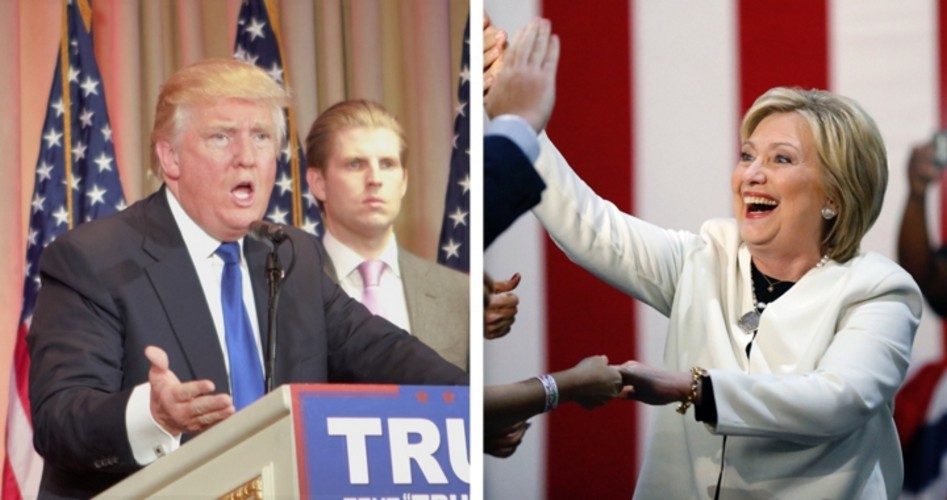
While it was not surprising, given the results of numerous polls, that former Secretary of State Hillary Clinton and business magnate Donald Trump won most of the Super Tuesday primary contests, none of the other candidates has announced that they are withdrawing from the presidential race. On the Democratic side, Clinton’s nomination is now considered to be inevitable, but Trump’s ultimate victory is subject to more roadblocks.
Although no other challenger is likely to surpass Trump in delegates before the Republican National Convention in Cleveland July 18-21, it is possible that his rivals may garner enough delegates to deny him the 1,237 delegates needed to win the Republican presidential nomination — thereby forcing a brokered convention. A brokered convention exists when no single candidate has secured a pre-existing majority of delegates and no candidate secures a majority of delegates after the first ballot is held.
In a February 29 article, we explained the mechanisms of such a convention, along with potential pitfalls. According to former RNC chairman Michael Steele, any attempt by GOP insiders to throw the election to one of their chosen golden boys instead of Trump could be a disaster for the party: “If they want to monkey around with this process and try to fix [the nomination], they’re asking for all hell to break loose.”
{modulepos inner_text_ad}
Looking at the results of the Super Tuesday primary, several trends unfolded. There was not much that was new on the Democratic side, with Clinton winning seven states (Alabama, Arkansas, Georgia, Massachusetts, Tennessee, Texas, and Virginia) to Vermont Senator Bernie Sanders’ four (Colorado, Minnesota, Oklahoma, and Vermont). These results give Clinton 1,034 delegates to Sanders’ 408, with 2,383 needed to win the Democratic nomination.
The Republican race is more complex, and therefore more interesting. As almost everyone knows by now, Trump won the lion’s share of contests, topping his rivals in Alabama, Arkansas, Georgia, Massachusetts, Tennessee, Vermont, and Virginia. Texas Senator Ted Cruz won the second-largest number of states, with Alaska, Oklahoma, and Texas going into his column. Texas is also sending the largest number of delegates to the convention, with 155. Florida Senator Marco Rubio got his first win during this primary season by carrying Minnesota. The delegate count for each candidate now stands at 316 for Trump, 226 for Cruz, 106 for Rubio, 25 for Ohio Governor John Kasich, and eight for retired neurosurgeon Ben Carson.
The next big testing grounds for the candidates will be on March 15, when primaries will be held in Florida, Illinois, Missouri, North Carolina, and Ohio. Not only are all of these fairly rich in delegates (with Florida being the big prize with 99 Republican delegates), but Ohio and Florida hold especially important significance. Each of these states is home to one of the candidates and, therefore, they are seen as “must-wins” for Kasich and Rubio. Furthermore, Ohio and Florida are important swing states that a Republican presidential candidate must capture to win the presidency, so a strong showing in these states serves as a good litmus test for viability in the general election in November.
As for the outlook for each of Trump’s rivals for the nomination, the generally liberal Washington Post ran a surprising article in its “Daily 202” report on March 2 headlined: “Ted Cruz might be the last, best hope for conservatives to stop Donald Trump after Super Tuesday.”
Contrasting Cruz’s showing with Rubio’s, the Post writer observed:
Cruz finally caught a few big breaks last night, and he could now emerge (once again) as the best bet to stop Trump. He won his home state of Texas by 17 points (the day’s biggest delegate prize), the neighboring state of Oklahoma (in a surprise) and the caucuses in Alaska (underscoring his appeal to libertarians and in spite of Sarah Palin’s support for Trump). He lost Arkansas to Trump by just 2 points.
— Rubio, meanwhile, had a very disappointing night and continues to not live up to his potential. He won only the Minnesota caucuses and wound up losing Virginia, which was fertile territory and where he campaigned hard.
Besides the obvious reality check that the Florida senator has won just one of the first 15 states (that’s a 1-14 record in football terms), he finished third yesterday behind Cruz in several states where he ought to have finished second, including Tennessee (where he had the backing of Gov. Bill Haslam and Sen. Lamar Alexander) and Massachusetts. Top Rubio campaign officials told donors before results came in yesterday that they might win outright in Arkansas and Oklahoma. He finished third in both of those places too. [Emphasis in original.]
Perhaps the most surprising observation of all was the Post’s following reference to something that Rubio’s campaign would rather not remind conservative voters of: “— Cruz today has far more delegates than Rubio, and he doesn’t have Gang of Eight baggage.” (Emphasis in original.)
The “Gang of Eight baggage,” of course, refers to Rubio’s inclusion among the bipartisan group of eight senators who wrote S. 744, the Border Security, Economic Opportunity, and Immigration Modernization Act. The bill was passed by the Senate on June 27, 2013, but the Republican House leadership refused to bring it up for a vote because it contained a “path to citizenship” (a nice term for amnesty) for illegal aliens already in the United States.
Shortly after the bill passed the Senate, Cruz sent an e-mail to his supporters reading, “This is urgent. We must stop this Gang of 8 immigration bill, which would give amnesty to an estimated 11 million illegal immigrants with no guarantee of a secure border.”
Perhaps even more surprising than that Post article was another that reported an apparent change of heart by Senator Lindsey Graham (R-S.C.). Graham, noted the Post, who has been an outspoken critic of Cruz, said to CBS’s Charlie Rose on Tuesday night, “Well, I think we’re about ready to lose to the most dishonest politician in America, Hillary Clinton, and how could you do that?”
“I made a joke about Ted, but we may be in a position to have to rally around Ted Cruz as the only way to stop Donald Trump, and I’m not so sure that would work,” he said, adding that when it came to that prospect, “I can’t believe I would say yes, but yes.”
The Washington politics-oriented newspaper The Hill began a story on March 2 with these words: “Clinton and Trump both emerged victorious on Super Tuesday, making it more clear than ever before that they are likely to face off in November.”
If that prediction holds true, where will that leave constitutionalist voters? Will they, as is usually the case, choose “the lesser of two evils,” or turn to a third-party candidate?
The two parities that often have appeal to constitutionalists are the Constitution Party and the Libertarian Party. The Constitution Party will hold its presidential nominating convention in Salt Lake City from April 13-16. The three candidates under consideration for the party’s nomination are Scott Copeland, an ordained minister; Patrick Ockander, a private citizen and author; and J.R. Myers, a lawyer and founder of the Alaska Constitution Party.
The Libertarian Party convention will held from May 26-30 in Orlando, Florida. The party’s declared candidates are former New Mexico Governor Gary Johnson and businessman John McAfee.
Photo: AP Images
Related articles:
Chances for a Brokered GOP Convention Are Rising, Along With Risks
Rubio and Cruz Put Trump on Defense in Sometimes Raucous Debate


